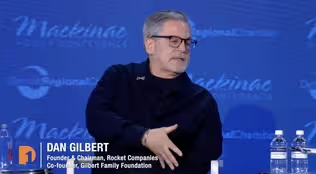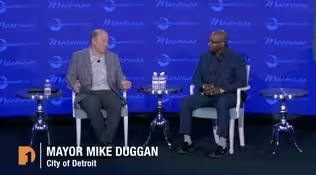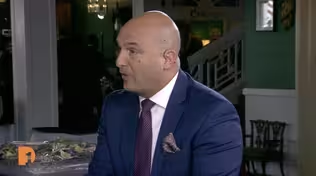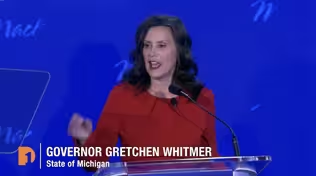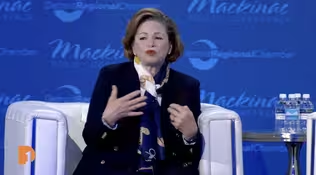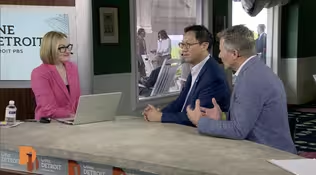
Michigan’s affordable housing shortage
Clip: Season 8 Episode 48 | 5m 11sVideo has Closed Captions
Community leaders talk Michigan’s affordable housing shortage and its impact on residents.
“One Detroit” contributor Zoe Clark talks with Samaritas Chief Advancement Officer Kelli Dobner and Michigan League for Public Policy President and CEO Monique Stanton about the affordable housing shortage across the state and its impact on residents.
Problems playing video? | Closed Captioning Feedback
Problems playing video? | Closed Captioning Feedback
One Detroit is a local public television program presented by Detroit PBS

Michigan’s affordable housing shortage
Clip: Season 8 Episode 48 | 5m 11sVideo has Closed Captions
“One Detroit” contributor Zoe Clark talks with Samaritas Chief Advancement Officer Kelli Dobner and Michigan League for Public Policy President and CEO Monique Stanton about the affordable housing shortage across the state and its impact on residents.
Problems playing video? | Closed Captioning Feedback
How to Watch One Detroit
One Detroit is available to stream on pbs.org and the free PBS App, available on iPhone, Apple TV, Android TV, Android smartphones, Amazon Fire TV, Amazon Fire Tablet, Roku, Samsung Smart TV, and Vizio.
Providing Support for PBS.org
Learn Moreabout PBS online sponsorship2018.
The Kellogg Foundation produced report titled The Business Case for Racial Equity and talked about the racial wealth gap that we have in our state, and that is costing our state $92 billion, and that if we close that gap by 2050, the state stands to gain that amount of money.
So our role at the Black Business Alliance, we really took that report.
You know, the report not only stated the facts, but also gave a road map to how do we actually do that work.
And part of it is access to capital for minority entrepreneurs.
It's business development in underserved areas.
And so our organization is trying to do that across the state.
And I think it's important to understand that if we are a state that wants to grow and develop, then we have to take a hit on the racial equity issue and we have to take on just a different lens and perspective to how we are shoring up opportunity for black businesses, small businesses, generally.
People want to live in a place where they are as walkable with thriving commercial corridors.
And absolutely how we treat small businesses as a state, how we deal with racial equity, will help determine whether or not we get to where we're trying to go.
Thank you, Dr. Perry.
So much to what the first question, particularly with your national lands, how are others addressing this moment and what have you seen in this work?
Well, first of all, thanks for having me.
And this is a great crowd.
Beautiful crowds packed.
So a lot of excitement.
What I tried to do with the national landscape is remind people, particularly during political seasons, that the work to maintain or even grow populations go beyond a political season, that this is establishing a policy agenda that enhances job creation, creates better schools, creates housing opportunities, increasing ownership, business ownership in particular.
And when you focus on the agenda, you can then you realize what it will take to maintain population and grow population here in Michigan.
You have a lot of the building blocks for those things to happen, but like a lot of states, it ebbs and flows.
With political season, people either build up an agenda that is maintained in the next administration, tear it down.
What I think is important for this room, and I think what's important for Kellogg is for the people in this room to understand these are the building blocks that we're going to impress upon whoever is in office, and we're going to maintain this.
We're going to hold you to that.
To that fire.
What you'll see in the report is a recognition, for example, that Michigan has a chance to really make up that median income gap that can drive prosperity with investments, for example, in our entrepreneurship and innovation ecosystem.
Michigan's already a top ten state for patents.
Michigan already has the preeminent black tech ecosystem in America, arguably in things like black tech SATs, for example.
But what we see is our entrepreneurs, who we have tons of folks who have Michiganders, have driven innovation in this country and around the world for a long, long time, unfortunately, struggle to get capital, for example.
And then when they're about to hire their first hundred folks, maybe you'll see capital flight.
So things like the innovation fund that's in the governor's budget or what have you, our attempts to make sure that we're investing in our entrepreneurs, keeping them here, capitalizing businesses, building intergenerational wealth, and closing meeting income gaps to help drive growth.
Charity to you as well to on that question and hearing this.
How do you see these strategies, you know, being beneficial and do you see the opportunities for engaging and building on are there parallel in support of the work you're undertaking at the Michigan Black Business Alliance?
Yeah, I'll say this.
The last 2 to 3 years have been really good for black businesses.
We still have a racial wealth gap, though, right?
So we still have a very long way to go.
But we have seen innovation and we have seen growth in Michigan.
Right.
And that is a result, a direct result of a number of things happening all at the same time.
Right.
So you've got the pandemic that happened that really highlighted what we already knew, the disparities that were already there, but provided an opportunity.
We had leadership at the federal level, state level that were really intentional about how are we directing resources to help black businesses.
But I am very nervous.
Things could change like this.
And all of the the growth that we've seen over the past couple of years, you know, could be taken away.
And this is why I think to Dr. Perry's point, it can't be a political issue and this is why we have to be unapologetic about calling out the disparities that exist.
Businessman and philanthropist Dan Gilbert on investing in Detroit
Video has Closed Captions
Clip: S8 Ep48 | 3m 23s | University Research Corridor shares efforts to attract businesses and talent to Michigan. (3m 23s)
Detroit Mayor Mike Duggan, Police Chief James White share the city’s progress and goals
Video has Closed Captions
Clip: S8 Ep48 | 4m 34s | Mayor Mike Duggan and Police Chief James White share Detroit’s progress and goals. (4m 34s)
DPSCD Superintendent Dr. Nikolai Vitti talks challenges, efforts to prepare students for the future
Video has Closed Captions
Clip: S8 Ep48 | 4m 3s | DPSCD Superintendent Dr. Nikolai Vitti shares efforts to prepare students for the future. (4m 3s)
Erb Family Foundation gifts $7.5 million to Detroit PBS for its move back to the city
Video has Closed Captions
Clip: S8 Ep48 | 1m 51s | The Erb Family Foundation gifts $7.5 million to Detroit PBS for its move back to the city. (1m 51s)
Gov. Gretchen Whitmer gives 2024 Mackinac Policy Conference keynote address
Video has Closed Captions
Clip: S8 Ep48 | 4m 28s | Michigan Gov. Gretchen Whitmer discusses her vision for moving the state forward. (4m 28s)
Key political leaders talk about partisanship ahead of the 2024 election
Video has Closed Captions
Clip: S8 Ep48 | 3m 42s | Key political leaders talk about partisanship ahead of the 2024 election. (3m 42s)
University Research Corridor shares its efforts to attract businesses, talent to Michigan
Video has Closed Captions
Clip: S8 Ep48 | 3m 52s | University Research Corridor shares efforts to attract businesses and talent to Michigan. (3m 52s)
Providing Support for PBS.org
Learn Moreabout PBS online sponsorship
- News and Public Affairs

Top journalists deliver compelling original analysis of the hour's headlines.

- News and Public Affairs

FRONTLINE is investigative journalism that questions, explains and changes our world.












Support for PBS provided by:
One Detroit is a local public television program presented by Detroit PBS
